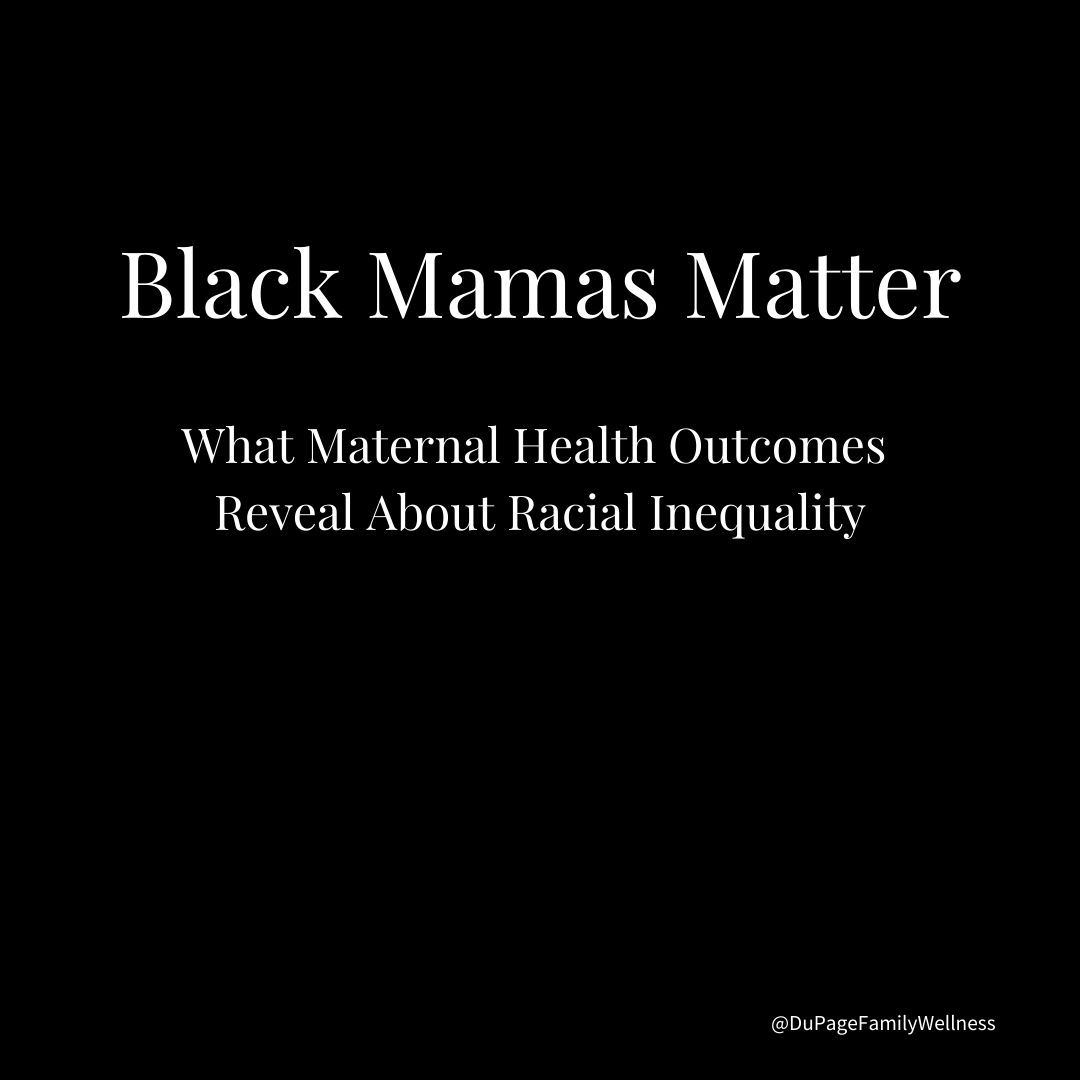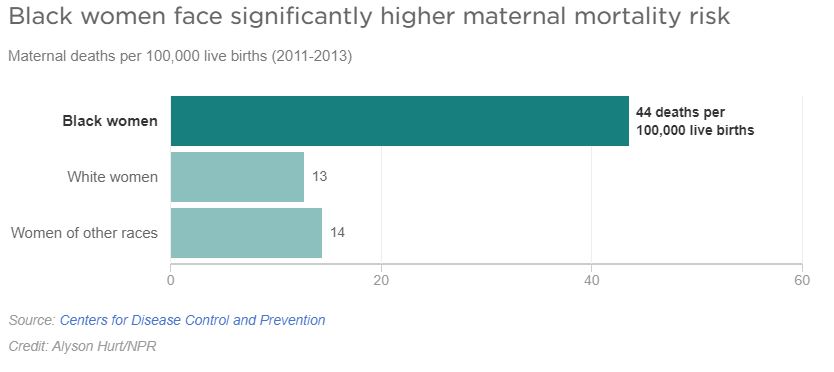 Looking at issues of racial inequality can be uncomfortable. Many people would like to believe that the world treats everyone in a fair manner. When evidence reveals that it doesn’t, we should be uncomfortable, because we shouldn’t be comfortable with injustice.
Looking at issues of racial inequality can be uncomfortable. Many people would like to believe that the world treats everyone in a fair manner. When evidence reveals that it doesn’t, we should be uncomfortable, because we shouldn’t be comfortable with injustice.
One would hope that the medical community - those there to care for your health - would be free from this inequality. Unfortunately, especially when it comes to maternal health outcomes that is simply not the case!
I understand that many things in this article may be hard to read. But if we want to truly understand these issues and make a difference, it is important to take an honest look at both where we are at as a nation and how we got there.
In a way, I hope this article makes you uncomfortable... uncomfortable enough to respond with compassionate action! (And don’t worry, we won’t be focusing only on the problem, there will be some action points at the end of the article so that you can be part of the solution today.)
Even though it is a good thing for many of us to be in this uncomfortable discussion, I want to honor those who have been affected directly by these issues. Therefore I am issuing my first ever trigger warning.
**Trigger Warning - Racial inequality, negative maternal health outcomes, maternal mortality, medical cruelty, etc.**
The Current Truth
In the US, Black women are actually three to four times more likely than White women to die from pregnancy related complications (1). Their babies have twice the rate of preterm deliveries and low birth rates (2). It is important to note that research has found “this increased risk of pregnancy-related death among Black women is independent of age, parity, or education” (3).
One study calculated the amount of patients with preeclampsia, eclampsia, abruptio placentae, placenta previa, and postpartum hemorrhage. It found that while the prevalence rates were the same, Black women were 2 to 3 times more likely to die from these issues then White women were (3).
In order to understand this tragedy, it is important to look at both our history as well as current factors.
Historical Racism and Its Effect on Medicine Today
There is a long history of inequality and blatant racism in our medical system. Many of us have heard about the Tuskegee experiments, where government-funded doctors denied treatment to 399 syphilitic patients to see the disease's full progression. The study included mostly poor, Black sharecroppers. These men were not even told that they had syphilis. By the end of the study 128 men had died of syphilis or syphilis related complications, 40 wives were infected, and 19 children were born with congenital syphilis.
The same racism has been seen many times throughout our history, but we don't often talk about this history. Not many have heard about the experimental operations that Dr. James Sims performed on slave women in the 1840’s. Dr. Sims is considered the “father of modern day gynecology,” but the methods he used to develop his procedures are appalling. In fact, his own assistants eventually refused to work with him, so other patients assisted him in surgery.
One of the women named Anarcha endured 30 operations without anesthesia under his hand. While some doctors of the time did not trust anesthesia, Sims actually believed that Black people did not experience pain the way White people did. Unfortunately, this misguided belief and other implicit racism affects medical care today.
Perception of Patient Pain Today
In 2012, a meta-analysis found that Black patients were 22% less likely to receive pain medicine than White patients (4). The disparages found are often not intentional, but at least in part are based on implicit beliefs that practitioners are not aware of. One 2019 study, asked participants to identify pain seen in pictures. White participants recognized pain more quickly in White faces than in Black faces (4). In another study, both patients and doctors were asked to rate the level of pain the patient was experiencing. Physicians were more likely to underestimate Black patients' pain (47%) compared to that of White patients (33.5%) (5).
Implicit racial bias must be recognized and addressed. It is a very real factor that can affect decisions made in treatment and lead to negative patient outcomes. However, implicit bias is not the only issue impacting maternal outcomes of Black women. It is a complex issue that goes far beyond the beliefs of practitioners. There is no way to fully explore this issue in one blog post, but let’s look at some of the systemic factors that unfairly impact Black women.
Additional Current Factors
Income disparages and lack of quality health care is a huge issue. Many Black women lack access to regular gynecological care and contraception. This may lead to the fact that Black women have the highest rates of unintended pregnancies (1). An unplanned pregnancy is a risk factor for depression, experiencing violence during pregnancy, as well as negative health outcomes for both mom and baby.
Studies indicate that Black women receive obstetric care in hospitals with a lower quality of care than White women. According to the National Partnership, “Black-serving hospitals have higher rates of maternal complications than other hospitals. They also perform worse on 12 of 15 birth outcomes, including elective deliveries, non-elective cesarean births and maternal mortality” (1).
Once the baby is born, accessing quality postpartum care continues to be an issue that impacts both physical and mental health. Only 30% of Black mothers are able to take unpaid maternity leave (1). That means the rest will either lose their jobs or be forced to go back to work before they are ready and healthy enough. In addition, Black women are twice as likely to deal with postpartum depression, but significantly less likely to get mental health care after delivery (6).
Make an Impact
I am bringing these issues up because we can’t fix something we don’t recognize. We can not pretend racial inequality doesn’t exist if we want better outcomes for Black moms and babies.
Those of us in the preconception, prenatal, and postpartum world definitely need to address these issues. Hopefully you will choose to be part of the solution as well!
If you would like to help, but are not sure what to do, check out these action steps provided by Latham Thomas, author and founder of Mama Glow.
- Sponsor a Doula of color in Doula training.
- Sponsor and support a midwifery student.
- Support black and brown birth workers and healers by hiring them for their services at their rate.
- Donate to a scholarship fund at a doula organization run by black women.
- Hire black birth educators to speak in institutions.
- Pay black birth workers to contribute their wisdom/writing for your platforms.
- Allocate financial support for black and brown birthing people who would like a doula.
- Pay for virtual doula services.
- Follow diverse accounts centering black and brown stories, voices and buy and support their offerings.
- Read, listen to podcasts, learn but act on that learning.
(We have chosen to invest in Chicago Birthworks Collective. They are dedicated to helping families of color "receive comprehensive birth and postpartum doula services and other critical support needed during and after pregnancy." Please consider finding out more about their mission or make a donation at their website today.)
Our passion is helping all mom’s on their journey to health. We believe that Black mothers and Black babies matter! And we want to do our part in creating a world that reflects that.
If you are interested in learning more about inequality in maternal health outcomes, please consider listening to The Center for Investigative Reporting's podcast Reproducing Racism.
Dr. Jamie
- https://www.nationalpartnership.org/our-work/health/reports/black-womens-maternal-health.html
- Martin et al., 2005
- https://ajph.aphapublications.org/doi/10.2105/AJPH.2005.072975
- https://www.aamc.org/news-insights/how-we-fail-black-patients-pain
- https://pubmed.ncbi.nlm.nih.gov/17534011/?dopt=Abstract
- https://khn.org/news/black-mothers-get-less-treatment-for-postpartum-depression-than-other-moms/


